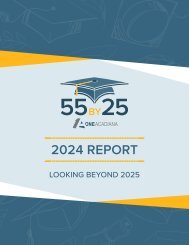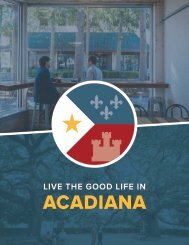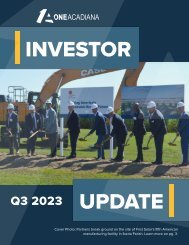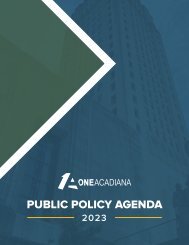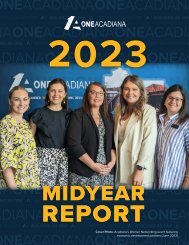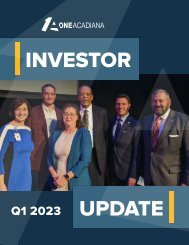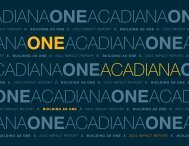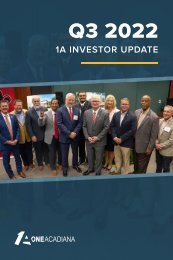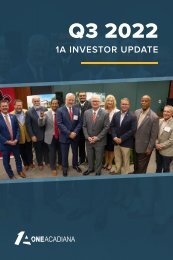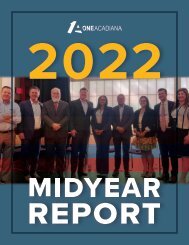55 by 25 2023 Report
Create successful ePaper yourself
Turn your PDF publications into a flip-book with our unique Google optimized e-Paper software.
<strong>2023</strong> REPORT<br />
STRENGTHENING PARTNERSHIPS<br />
BETWEEN INDUSTRY AND EDUCATION
THE PURPOSE<br />
In 2019, One Acadiana and regional partners launched the <strong>55</strong> <strong>by</strong> <strong>25</strong> initiative to address the economic<br />
and moral imperative for increasing educational attainment. To ensure Acadiana is globally competitive,<br />
the region requires a strong and well-educated workforce. No accomplishment will be more critical to<br />
our future as a region.<br />
For many years, the blessings of the oil & gas industry – where one could earn a good living without<br />
a postsecondary degree – created an environment where higher education was desirable but not<br />
essential. As our regional economy evolves, many more of our citizens will need postsecondary<br />
degrees and high-value credentials to equip them for good jobs and good wages.<br />
“Increasingly, the level of education of a community’s population is becoming<br />
a decisive factor in economic competitiveness. Firms understand the need to<br />
operate in economies that offer a sufficient supply of workers that meet or<br />
exceed their demands. They also know that the lack of an educated<br />
workforce can significantly affect business performance.”<br />
— Garner Economics,<br />
One Acadiana Target Industry Strategy<br />
THE VISION<br />
• An equitable education system that meets the region’s need for talent and offers all Acadiana<br />
residents the chance for a better life through increased educational attainment<br />
THE GOAL<br />
• Increasing the proportion of working-age adults in Acadiana with postsecondary degrees,<br />
certificates, or other high-value credentials to <strong>55</strong>% <strong>by</strong> 20<strong>25</strong>.<br />
<strong>55</strong> <strong>by</strong> <strong>25</strong> partners are focused on supporting programs and pathways that provide job seekers with<br />
the opportunities and resources they need to gain education and training to secure good jobs and<br />
good wages.<br />
This year, we’re putting special focus on strengthening partnerships between industry and education.<br />
2 1
THE DATA<br />
THE DASHBOARD<br />
STARTING FROM BEHIND AS A REGION<br />
In terms of the percent of adults (age <strong>25</strong>+) with an associate degree or higher:<br />
• Louisiana ranks 48th as a state<br />
• Within Louisiana, Acadiana ranks in the bottom half (5th out of 8) as a region<br />
The good news is, Lumina Foundation estimates Louisiana ranks 4th in the nation for attainment of<br />
postsecondary certificates and industry-recognized certifications. Evaluating postsecondary attainment<br />
including both degrees and these short-term credentials, Louisiana ranks 44th as a state.<br />
Understanding current educational attainment levels and tracking progress over time is critical to achieving<br />
collective success in improving regional education outcomes. For that reason, 1A developed an interactive<br />
data dashboard to collect and report on the latest educational attainment data for our region. The<br />
dashboard uses data from publicly available sources like the Louisiana Department of Education and the<br />
U.S. Census Bureau.<br />
The dashboard answers five guiding questions with data on nine key performance indicators.<br />
GUIDING QUESTIONS<br />
KEY INDICATORS<br />
PERCENT OF ACADIANA ADULTS AGE <strong>25</strong>+ WITH A POSTSECONDARY DEGREE*<br />
1<br />
What is the big<br />
picture of educational<br />
attainment in Acadiana?<br />
• % of adults with an associate degree or higher<br />
2<br />
Are Acadiana<br />
students mastering<br />
grade-level content?<br />
• Mastery of 3rd grade English Language Arts<br />
• Mastery of 8th grade math<br />
• Average grade-level mastery <strong>by</strong> subgroup<br />
3<br />
Are Acadiana students<br />
graduating high school<br />
and ready for college?<br />
• High school graduation rates<br />
• ACT scores<br />
4<br />
Are Acadiana students<br />
transitioning to college?<br />
• College-going rates<br />
• College enrollment<br />
5<br />
Are Acadiana students<br />
completing college?<br />
• College retention rates<br />
• College graduation rates<br />
KEY TAKEAWAYS<br />
As of the latest Census data (for 2021), 28.1% of Acadiana adults have an associate degree or higher<br />
level of education (up 0.6% pts from 2020). Adding in Lumina Foundation’s statewide estimate for<br />
attainment of certificates and industry-recognized certifications (12.8%), our overall attainment rate<br />
is 40.9%. If the current trendline continues, our overall attainment rate would reach 44.5% in 20<strong>25</strong>,<br />
leaving us short of the <strong>55</strong>% goal.<br />
Additionally concerning, college enrollment numbers across the country have been trending downward<br />
not upward, due in part to the effects of the COVID-19 pandemic. A recent Public Affairs Research<br />
Council of Louisiana (PAR) report also notes the likelihood of another drop in enrollment beginning in<br />
20<strong>25</strong> due to a decline in U.S. birthrates that started during the Great Recession.<br />
To get ahead of the curve, we must innovate and foster stronger partnerships between industry<br />
and education.<br />
Visit the <strong>55</strong> <strong>by</strong> <strong>25</strong> dashboard at<br />
<strong>55</strong><strong>by</strong><strong>25</strong>Acadiana.org/TheDashboard<br />
Select data also available via the<br />
Vibrant Acadiana dashboard at<br />
VibrantAcadiana.com<br />
2 3
PARTNERSHIPS TO ALIGN EDUCATION<br />
AND CAREERS<br />
The Southern Region Education Board (SREB) recently published a report through its Commission on<br />
Strategic Partnerships for Work-Ready Students on “Partnerships to Align Education and Careers.” The<br />
commission writes:<br />
“Today, it’s more important than ever to prepare students with the<br />
skills they need for careers that fuel our local economies. This is<br />
complex work, beyond the ability of K-12, higher education, adult<br />
education, or workforce investment boards to do alone.<br />
Through strategic industry sector partnerships, educators and<br />
employers can align academics and work-based learning experiences<br />
with jobs in demand in their states – improving individual lives, state<br />
prosperity, and economic competitiveness.”<br />
ONE ACADIANA’S INDUSTRY ROUNDTABLE SERIES<br />
One of the ways the <strong>55</strong> <strong>by</strong> <strong>25</strong> initiative is advancing these SREB recommendations is through an industry<br />
roundtable series.<br />
Convened as part of One Acadiana’s Workforce & Education Committee, the quarterly industry roundtable<br />
series brings together employers who require similar skill sets in their workforces to discuss their shared<br />
needs with education and training providers.<br />
The roundtables are a chance for peers within an industry to discuss their workforce challenges and best<br />
practices, including recruiting, hiring, training, retaining talent, and more.<br />
1A INDUSTRY ROUNDTABLES<br />
Q3 2022<br />
Q4 2022<br />
Q1 <strong>2023</strong><br />
The report highlights several focus areas to better prepare students for in-demand jobs and help employers<br />
meet their workforce needs, including:<br />
›<br />
›<br />
›<br />
›<br />
›<br />
›<br />
INDUSTRY PARTNERSHIPS<br />
Bring together employers in related business sectors with educators in local<br />
schools and colleges.<br />
IN-DEMAND CAREERS<br />
Focus on career pathways for good jobs available in the region.<br />
COMMITTED LEADERSHIP<br />
Convene the many agencies, councils, and boards to help them agree on a<br />
path forward.<br />
WORK-BASED LEARNING<br />
Promote a continuum of experiences from middle grades through postsecondary<br />
credentials.<br />
STRATEGIC FUNDING<br />
Align funds from federal, state, and private sources toward the same goals.<br />
EDUCATOR CAPACITY<br />
Build the skills of teachers, counselors, and principals to help students explore<br />
and prepare for careers.<br />
OUTCOMES<br />
HEALTHCARE<br />
MANUFACTURING<br />
Outcomes of past industry roundtables include the development of a new respiratory therapy<br />
apprenticeship program and promotion of a new software developer apprenticeship program, both the<br />
first of their kind in the state.<br />
INDUSTRY + EDUCATION PARTNERSHIP PROFILES<br />
INFORMATION<br />
TECHNOLOGY<br />
Learn about these apprenticeship programs and other innovative partnerships<br />
between industry and education on the following pages:<br />
Ochsner Respiratory Therapy Apprenticeship....................................... 6<br />
CGI Software Developer Apprenticeship................................................ 7<br />
SLCC Power Lineman Program................................................................ 8<br />
SLCC Fiber-Optic Technician Program.................................................... 9<br />
Master’s Guild of Acadiana Journeyman Initiative................................ 10<br />
4 5
OCHSNER RESPIRATORY THERAPY APPRENTICESHIP<br />
THE NEED: COVID-19 created an urgent need for respiratory<br />
therapists in Acadiana.<br />
CGI SOFTWARE DEVELOPER APPRENTICESHIP<br />
THE NEED: There is a shortage of qualified applicants for tech jobs, particularly<br />
among women and people of color, resulting in a need to bridge these tech<br />
talent and diversity gaps.<br />
PROGRAM OVERVIEW<br />
• Ochsner Lafayette General has teamed up with LSU Eunice to create a first-of-its-kind<br />
respiratory therapy apprenticeship program.<br />
• Through the apprenticeship, once students complete their required academic courses<br />
(18 months), they will be employed <strong>by</strong> Ochsner to “earn while they learn” for their clinical<br />
rotations (18 months).<br />
• Acadiana Workforce Solutions is<br />
providing resources such as funding<br />
for wraparound services to ensure<br />
student success.<br />
• The intention is to recruit a diverse<br />
population of students that have<br />
traditionally been underrepresented<br />
in the allied health workforce,<br />
recognizing that better care comes<br />
from better representation of the<br />
population served.<br />
NEXT STEP<br />
• This pilot program is aiming to launch in fall <strong>2023</strong> with a cohort of 10 students.<br />
• This model can be used for other healthcare occupations, other companies, and<br />
other industries.<br />
• For more information, contact Kathleen Warner, Program Director for Respiratory Care at<br />
LSU Eunice: (337) <strong>55</strong>0-1341 // kreynold@lsue.edu<br />
PROGRAM OVERVIEW<br />
• In 2021, CGI piloted and executed Louisiana’s first U.S. Department of Labor (DOL)<br />
registered software developer apprenticeship program. In August 2022, CGI apprentices<br />
completed and earned U.S. DOL software engineer journeyworker certification and were<br />
promoted to consultants.<br />
• Through structured training and mentorship, tech apprenticeships help build in-demand<br />
skills to enhance CGI’s delivery capabilities to their clients.<br />
• Apprentices attend 3-5 months of technical training, based on the desired occupational<br />
role, before joining CGI for 12 months of on-the-job training that will equip them for a new<br />
career in IT. During this time, apprentices grow their skills through structured technical and<br />
interpersonal training.<br />
• Once apprentices successfully complete 2,000 program hours, they have the opportunity<br />
to continue their careers at CGI at a consultant level, supporting clients worldwide.<br />
• CGI partnered with intermediary, Apprenti, to register their apprenticeships through U.S.<br />
DOL. Apprenti, a 501(c)(3) nonprofit, supports hiring partners with the creation, sourcing,<br />
and management of apprenticeship programs.<br />
NEXT STEP<br />
• CGI is committed to building a new paradigm for education and employment in the<br />
digital economy. The company is pioneering tech apprenticeship pathways that<br />
create socioeconomic mobility for the benefit of high-potential job seekers from<br />
diverse backgrounds.<br />
• CGI has expanded its tech apprenticeship program to accommodate larger cohorts and<br />
offer more occupational roles.<br />
LEARN MORE: BIT.LY/RESPIRATORY-THERAPY<br />
LEARN MORE: BIT.LY/CGI-SOFTWARE-DEVELOPER<br />
6 7
SLCC POWER LINEMAN PROGRAM<br />
THE NEED: Louisiana has a high demand for power linemen to service the area’s utility<br />
needs and to quickly respond to outages such as those following hurricanes.<br />
PROGRAM OVERVIEW<br />
• Utility companies Cleco, Entergy, LUS, and SLEMCO have partnered with SLCC to produce<br />
a continuous pipeline of qualified line workers to meet the area’s needs.<br />
• The 20-week power lineman program includes numerous industry-based credentials, such<br />
as Class A CDL, NCCER Core, NCCER Lineman Level 1, and more.<br />
• SLCC has also partnered with Atmos Energy and 811 to include Damage Prevention training.<br />
• Students train alongside industry partners and their<br />
teams at SLCC’s Acadian Campus in Crowley.<br />
• Students also experience field observations, plant<br />
tours, and substation tours.<br />
• Because power lineman is a high-demand job in<br />
Louisiana, this program has a variety of funding<br />
options to assist with tuition.<br />
RECENT SUCCESS<br />
• SLCC has enrolled 152 students in the power<br />
lineman program.<br />
• SLCC has graduated 9 cohorts since January 2020,<br />
with 21 students in Cohort 10 scheduled to graduate<br />
in Spring <strong>2023</strong>.<br />
• Since the program’s inception, SLCC has successfully<br />
trained 131 graduates that transitioned to fill industry<br />
workforce needs.<br />
NEXT STEP<br />
• A new cohort is starting in April <strong>2023</strong>.<br />
• For enrollment and tuition assistance, please call<br />
(337) 788-7526.<br />
SLCC FIBER-OPTIC TECHNICIAN PROGRAM<br />
THE NEED: To take advantage of federal funding to increase broadband connectivity,<br />
there is an imminent need to increase workforce capacity to install and service this<br />
critical new infrastructure.<br />
PROGRAM OVERVIEW<br />
• Given federal and state initiatives to support broadband<br />
expansion, SLCC and industry partners including Cox<br />
Communications, System Services, AT&T, LUS Fiber, Reach4,<br />
and more partnered to develop a fiber-optic training<br />
program that will produce new qualified workers at an<br />
accelerated rate.<br />
• This 20-week program covers a variety of aspects of<br />
broadband training from construction to fiber to the home.<br />
• It is embedded with various industry-based credentials such<br />
as NCCER Core, AT&T/Corning, Class A CDL, and Ditch<br />
Witch certification.<br />
• SLCC has also partnered with Atmos Energy and 811 to<br />
include Damage Prevention training.<br />
• Students experience field observations and industrysupported<br />
lab activities.<br />
• This program is eligible for the Retool Workforce Program,<br />
a partnership with Acadiana Workforce Solutions that will<br />
fund up to 40 qualified students using WIOA (Workforce<br />
Innovation and Opportunity Act) resources.<br />
• Students may also qualify for other tuition assistance<br />
opportunities.<br />
RECENT SUCCESS<br />
• SLCC has a waiting list of interested students that is<br />
continually growing while waiting on the program to launch.<br />
NEXT STEP<br />
• Classes will be starting soon!<br />
• For enrollment and tuition assistance, please call (337) 788-7526.<br />
LEARN MORE: SOLACC.EDU/CONTINUING-EDUCATION/POWER-LINE-WORKER<br />
LEARN MORE: SOLACC.EDU/CONTINUING-EDUCATION/FIBER-OPTIC-TECHNICIAN<br />
8 9
MASTER’S GUILD OF ACADIANA JOURNEYMAN INITIATIVE<br />
THE NEED: There is a lack of awareness among job seekers of how and where<br />
to start a career in the construction industry.<br />
PROGRAM OVERVIEW<br />
• Master’s Guild of Acadiana (MGA) is a community of construction industry employers who<br />
believe that an exceptionally skilled workforce is the key to improving the construction<br />
industry, local economy, and communities they serve. MGA recruits people with the<br />
willingness and capacity to learn and provides the mentorship for them to succeed.<br />
• Through the Journeyman Initiative, MGA candidates complete a 4-week course, which<br />
prepares them for on-the-job training in residential construction.<br />
• Upon completion of the introductory course, MGA recruits have many opportunities for<br />
additional training. MGA tracks their progress as they rise from apprentice to journeyman,<br />
certifying their qualifications to supervise, train, or work independently.<br />
• Those hired <strong>by</strong> MGA can be deployed to assist MGA member companies at sites, giving<br />
them the chance to experience a variety of jobs and specialties until they find a good fit and<br />
are hired <strong>by</strong> one of the employers.<br />
• This process helps unskilled workers navigate the opportunities in residential construction<br />
while supporting employers who need to stay focused on the job site.<br />
BEYOND 20<strong>25</strong><br />
While the <strong>55</strong> <strong>by</strong> <strong>25</strong> initiative has provided a north star for increasing postsecondary attainment<br />
in the Acadiana region, the Louisiana Board of Regents Master Plan furnishes a related north star<br />
and talent imperative for the state. Looking beyond the <strong>55</strong> <strong>by</strong> <strong>25</strong> initiative’s time horizon of 20<strong>25</strong>,<br />
One Acadiana will continue to promote postsecondary attainment as a key economic development<br />
priority, and we will align our efforts with the Board of Regents Master Plan.<br />
LOUISIANA BOARD OF REGENTS MASTER PLAN<br />
The Louisiana Board of Regents, the state’s higher education policy board, adopted a Master<br />
Plan in 2019 that set forth a goal of 60% of Louisiana adults holding a degree or high-value<br />
credential <strong>by</strong> 2030. To reach this goal, the Board has established a three-part strategy to<br />
produce 180,000 additional degree or credentials between 2022 and 2030:<br />
RECENT SUCCESS<br />
In the past 2 years:<br />
NEXT STEP<br />
• 73 candidates have completed the introductory course.<br />
• 48 candidates have enrolled in on-the-job-training (OJT).<br />
• 28 candidates have been offered full-time employment.<br />
• MGA will continue to regularly offer their “Intro to Construction” course.<br />
• They also are now providers of training for the Home Builders Institute’s PACT Certificate,<br />
an industry-recognized and portable pre-apprenticeship credential for employment in the<br />
U.S. construction industry.<br />
• Anyone interested in a career in construction can reach out to the Master’s Guild of<br />
Acadiana <strong>by</strong> calling (337) <strong>55</strong>2-6086.<br />
Reaching these benchmarks will require innovative approaches, including new education<br />
delivery models that weave together learning and work, aligning program offerings with<br />
industry demand. As the Master Plan states:<br />
“Higher education across the country has recognized the need to act as<br />
a liaison between the student population – people in search of personal<br />
and professional growth – and business and industry – the source of<br />
high-wage, high-demand jobs. Aligning program offerings and curricula<br />
with market needs is critical to building the classroom-to-work pipeline<br />
and positioning today’s students for tomorrow’s job opportunities.”<br />
LEARN MORE: MASTERSGUILDOFACADIANA.COM<br />
Recently, the Board of Regents has taken steps to proactively partner with business and<br />
industry in responding to statewide and regional market needs. Two of those steps are:<br />
(1) Adopting a strategic degree-planning process and (2) creating a new degree type.<br />
10 11
OTHER NEXT STEPS<br />
STRATEGIC DEGREE-PLANNING PROCESS<br />
To better align academic programs with employment opportunities, one of the strategies the<br />
Board of Regents has adopted is updating its degree-planning process to take into account<br />
economic development factors as well as industry needs.<br />
Academic Program Proposals now include:<br />
SUPPORTING RURAL LEARNERS<br />
While Lafayette Parish is on track to reach the <strong>55</strong> <strong>by</strong> <strong>25</strong> goal<br />
as a parish, more attention must be given to our rural parishes<br />
in the Acadiana region.<br />
1. A Career Demand<br />
Analysis that evaluates:<br />
real-time job postings<br />
compared to hiring,<br />
the current educational<br />
contribution of Louisiana<br />
public higher education,<br />
and acceleration of<br />
forecast job demand.<br />
2. Three-year Academic<br />
Plans with input from<br />
economic development<br />
and industry stakeholders<br />
to align the institution’s<br />
degree portfolio with<br />
state and regional talent<br />
pipeline needs as well as<br />
Regents’ Master Plan.<br />
3. A Curriculum Structure<br />
that addresses<br />
technical skills and<br />
career competencies<br />
(e.g., professionalism,<br />
communication, digital<br />
literacy) and incorporates<br />
work-based or<br />
experiential learning.<br />
To support our rural learners, One Acadiana has been<br />
selected <strong>by</strong> the Association of Chamber of Commerce<br />
Executives (ACCE) Foundation to participate in an Economic<br />
Mobility for Rural Workers Cohort.<br />
ACCE Foundation will provide technical assistance, consulting support, peer learning<br />
opportunities, and connections to content experts. The cohort of 11 communities from across<br />
the country will be divided into four subgroups to pilot strategies to help low-income rural<br />
workers secure well-paid jobs.<br />
A NEW DEGREE TYPE: THE NEXUS DEGREE<br />
Additionally, for the first time in more than 100 years, the Board of Regents has created a new<br />
degree type, the nexus degree.<br />
A nexus degree combines specialized academic coursework in a high-demand career field with<br />
a significant work-based learning experience. It may be earned as an entry-level credential, in<br />
combination with a traditional undergraduate degree, or after a student has already earned an<br />
undergraduate degree, to redirect their career path or add to their credential portfolio.<br />
21 Hours<br />
Specialized subjectbased<br />
content<br />
(including at least<br />
9 hours of<br />
work-based learning)<br />
NEXUS DEGREE (60 Hours)<br />
27 Hours<br />
Board of Regents<br />
General Education<br />
Requirements<br />
12 Hours<br />
General<br />
Electives<br />
Chambers of commerce and economic development organizations like One Acadiana are<br />
uniquely positioned to build and support cross-sector coalitions that create sustained business<br />
engagement in education and workforce development. Through facilitating connections<br />
between employers, education and training providers, and job seekers, we can help ensure<br />
rural learners have clear pathways to well-paid employment without relocating.<br />
SCHOLARSHIPS FOR RETURNING LEARNERS<br />
While many high school graduates receive funding<br />
and assistance to enter their freshman year at a<br />
higher education institution, fewer scholarship<br />
opportunities exist for students continuing their<br />
education.<br />
One Acadiana is proud to continue our scholarship<br />
program for returning students in the Acadiana<br />
region, in partnership with LSU Eunice, SLCC,<br />
Unitech Training Academy, and UL Lafayette.<br />
The Board of Regents officially adopted the nexus degree into policy at its January <strong>2023</strong><br />
meeting. Two-year and four-year institutions are now eligible to create and offer nexus degree<br />
programs, with all new programs subject to approval <strong>by</strong> the Board.<br />
Louisiana is the second state in the country to offer the nexus degree, which was pioneered<br />
in Georgia. Georgia’s nexus degree offerings include aerospace, blockchain, cybersecurity,<br />
financial technology, health informatics, information technology, and more.<br />
LEARN MORE: ONEACADIANA.ORG/SCHOLARSHIPS<br />
12 13
Share related activities<br />
and success stories:<br />
#<strong>55</strong><strong>by</strong><strong>25</strong>Acadiana



